Why Understanding a Mortician's Role Matters in Death Care
What's a mortician do is one of the most common questions people ask about the funeral industry, yet many people only have a vague understanding of this essential profession. A mortician is a licensed professional who prepares deceased bodies for burial or cremation, coordinates funeral services, and provides emotional support to grieving families during one of life's most difficult moments.
Here's what morticians do on a daily basis:
- Prepare bodies through embalming, dressing, and cosmetic restoration
- Coordinate funeral logistics including transportation, scheduling, and venue arrangements
- Handle legal paperwork such as death certificates, burial permits, and insurance claims
- Support families by offering grief counseling and guiding funeral decisions
- Manage business operations from inventory to vendor relationships
- Work on-call schedules responding to deaths within 24-72 hours
The death care industry serves every community across America, with morticians playing a central role in helping families honor their loved ones with dignity. This profession requires specialized education, state licensing, and the emotional resilience to support others during their darkest hours.
As Mortuary Cooler, a national mortuary cooler supplier with experience in the death care industry, I've worked closely with funeral professionals to understand what's a mortician do and the specialized equipment they need to serve families effectively.
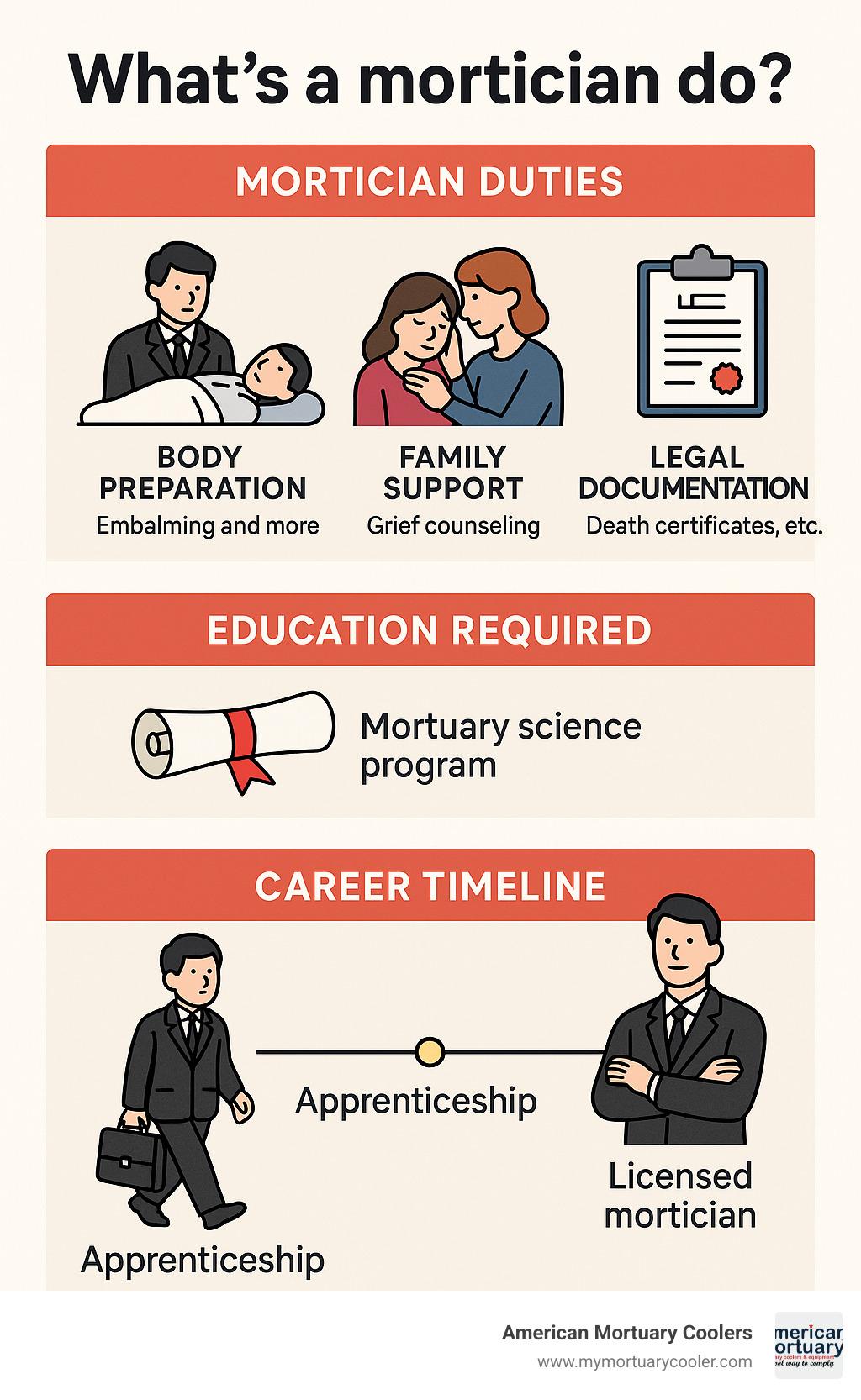
What's a mortician do vocab explained:
What Is a Mortician? Titles, History & Misconceptions
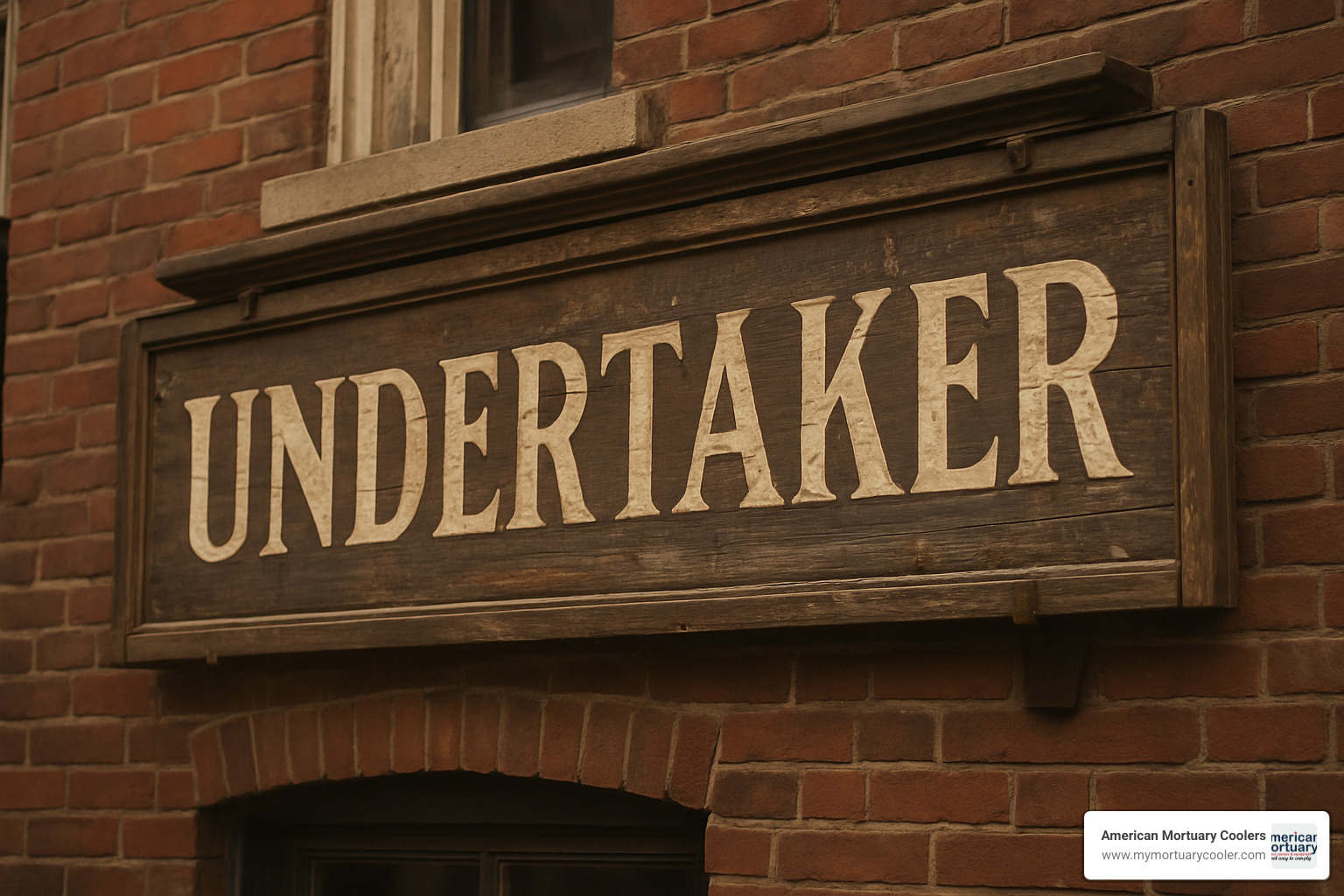
When someone asks what's a mortician do, they're often surprised to learn this profession has one of the most interesting naming histories in America. The word "mortician" didn't even exist until 1895, when a trade magazine invented it to help the industry shake off some negative stereotypes.
The term comes from the Latin word mort (meaning death) plus the suffix -ician - just like physician or technician. The goal was to make the profession sound more medical and professional.
Before "mortician" became popular, these professionals were called undertakers. Death care has always been essential to human society. In Ancient Egypt, specialized priests spent up to 70 days preparing mummies. Ancient Romans hired professional mourners for elaborate funeral ceremonies. The modern funeral industry really took shape in the mid-1800s when embalming became more common, especially during the Civil War.
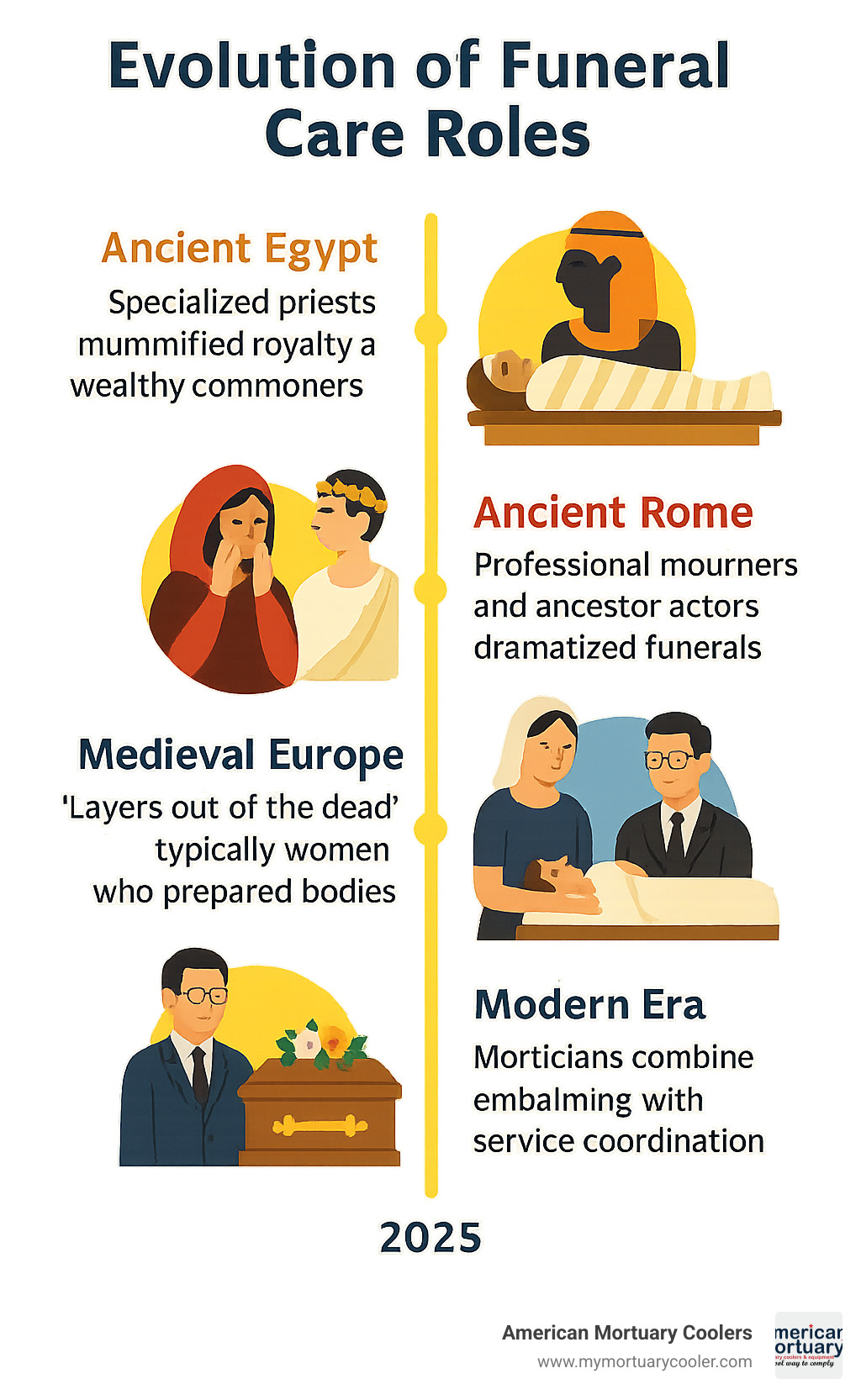
According to Mental Floss's research on how morticians reinvented their job title, the profession has gone through several rebranding efforts to improve public perception.
Mortician vs. Funeral Director vs. Embalmer: Quick Definitions
A mortician typically focuses on the technical side - body preparation, embalming, and restoration work. A funeral director handles more of the service coordination - working with families, planning ceremonies, and managing business operations. An embalmer specializes specifically in chemical preservation and cosmetic restoration of bodies.
| Role | Primary Tasks | Training Focus | Licensing |
|---|---|---|---|
| Mortician | Body preparation, embalming, restoration | Technical embalming skills, anatomy | Embalmer's license |
| Funeral Director | Service coordination, family counseling, business management | Grief counseling, event planning, business law | Funeral director's license |
| Embalmer | Chemical preservation, cosmetic restoration | Anatomy, chemistry, restorative arts | Specialized embalmer certification |
In reality, most funeral professionals today wear multiple hats, especially in smaller funeral homes.
Persistent Myths Debunked
Despite providing essential services, morticians still deal with unfair stereotypes. The gloomy, gothic stereotype is probably the most common myth. Movies portray morticians as dark, mysterious characters, but most are warm, caring people who genuinely want to help families.
The old body snatching fears still pop up sometimes, but today's morticians work within strict legal frameworks with proper permits and detailed protocols. Understanding what's a mortician do reveals a profession built on compassion, technical skill, and genuine care for others during life's most challenging moments.
What's a Mortician Do? Core Duties Explained
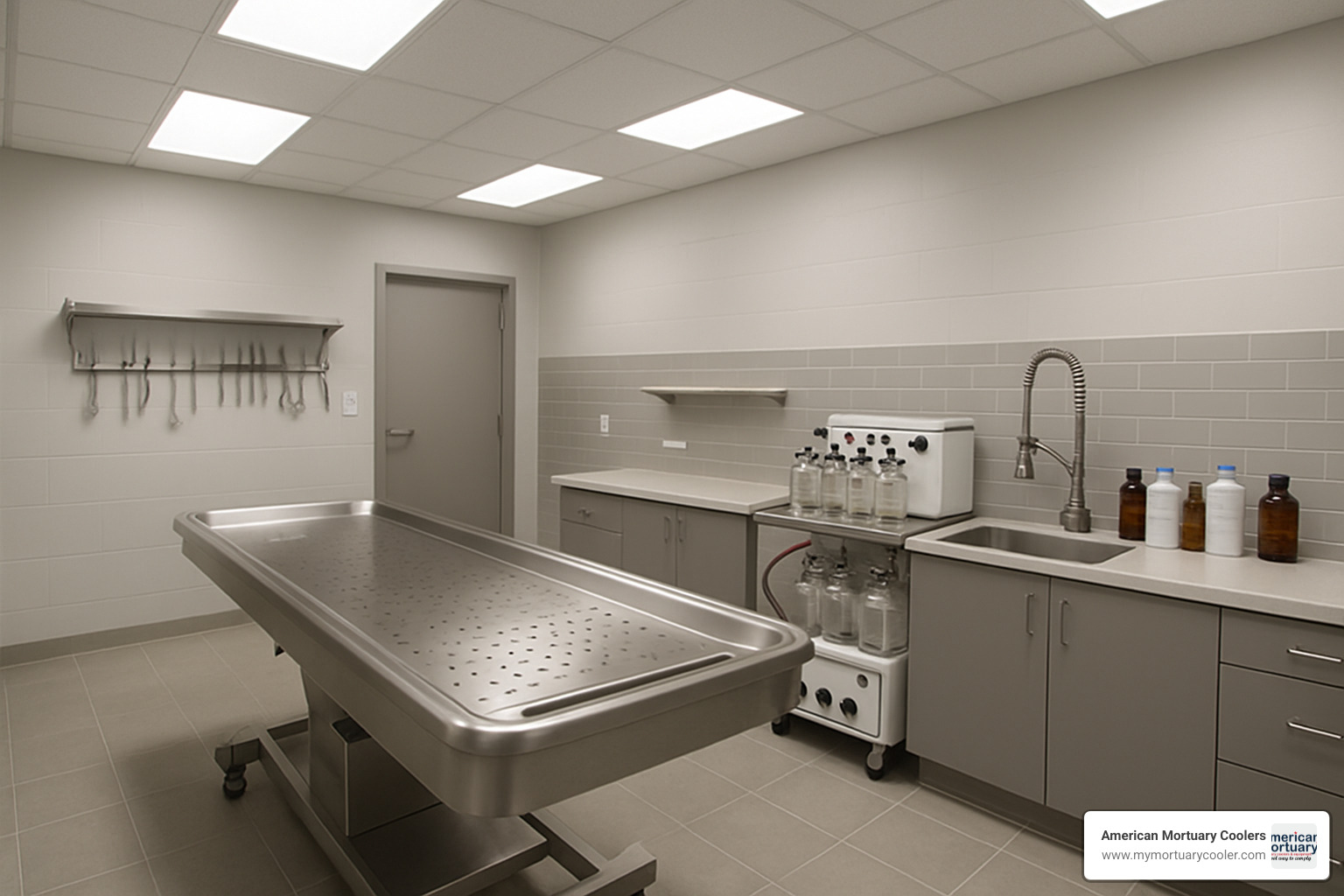
When people ask what's a mortician do, they're often surprised to learn how varied and complex this profession really is. Morticians juggle technical skills, business management, and emotional support in ways that make every day different.
Think of a mortician as part scientist, part counselor, and part event coordinator. One moment they might be carefully preparing a body using advanced preservation techniques, and the next they're sitting with a grieving family, helping them choose flowers for a memorial service.
Body removal and transportation starts the process. Morticians respond to calls from hospitals, nursing homes, and private residences, safely transporting the deceased to their facility. Then comes the administrative mountain - death certificates, burial permits, and insurance claims all require processing.
The business side keeps morticians busy too. They meet with families to discuss service options, manage facility schedules, and coordinate with everyone from clergy to cemetery workers.
Technical Body Preparation—What's a Mortician Do Behind the Scenes
The technical work happens away from family view, but it's perhaps the most skilled part of what's a mortician do. This is where science meets art, and where years of training in anatomy and chemistry come together.
Arterial embalming forms the foundation of body preparation. Morticians inject specialized preservative chemicals into the circulatory system, temporarily preventing decomposition and allowing families time for viewing and services. Every step follows strict OSHA safety protocols with protective equipment and proper ventilation.
When trauma or illness has affected appearance, restorative art becomes crucial. Morticians use specialized materials to rebuild damaged areas, match skin tones, and apply cosmetics to help restore a natural, peaceful appearance.
The final preparation involves dressing the deceased in chosen clothing and positioning them properly in the casket. Every detail matters - from the angle of hands to the final grooming touches.
At American Mortuary Coolers, we understand how important proper body storage is during this preparation process. Our custom mortuary coolers maintain the precise temperatures morticians need, giving them adequate time for thorough, respectful preparation work. More info about mortuary role
Family Support & Logistics—What's a Mortician Do for the Living
While body preparation gets attention, what's a mortician do for living family members often proves equally important. This is where technical expertise meets deep human compassion.
Grief counseling isn't formally part of most morticians' training, but it becomes part of their daily reality. They provide initial comfort when families are in shock and explain options without overwhelming people.
The event planning aspect surprises many people. Morticians coordinate complex logistics - scheduling venues, arranging transportation, coordinating with clergy and musicians, and organizing pallbearers.
Pre-need planning represents a growing part of the profession. Morticians help families plan ahead, discussing wishes and preferences before they're needed. Cremation coordination has become increasingly important as more families choose this option.
Insurance claims processing, Social Security notifications, and Veterans Affairs coordination all fall under the administrative support morticians provide.
Skills, Traits & Work Environment

When people ask what's a mortician do, they're often surprised to learn this profession requires such a unique blend of scientific knowledge and human compassion. Successful morticians must master technical skills while navigating the delicate emotional landscape of grief.
The most essential quality for any mortician is genuine empathy. You'll spend countless hours with families during their worst moments. This emotional intelligence must be paired with exceptional communication skills and attention to detail - families often find great comfort in seeing their loved one looking peaceful and natural.
Physical stamina is essential - you'll be lifting heavy weights, standing for hours during embalming procedures, and working irregular schedules that can stretch well into the night.
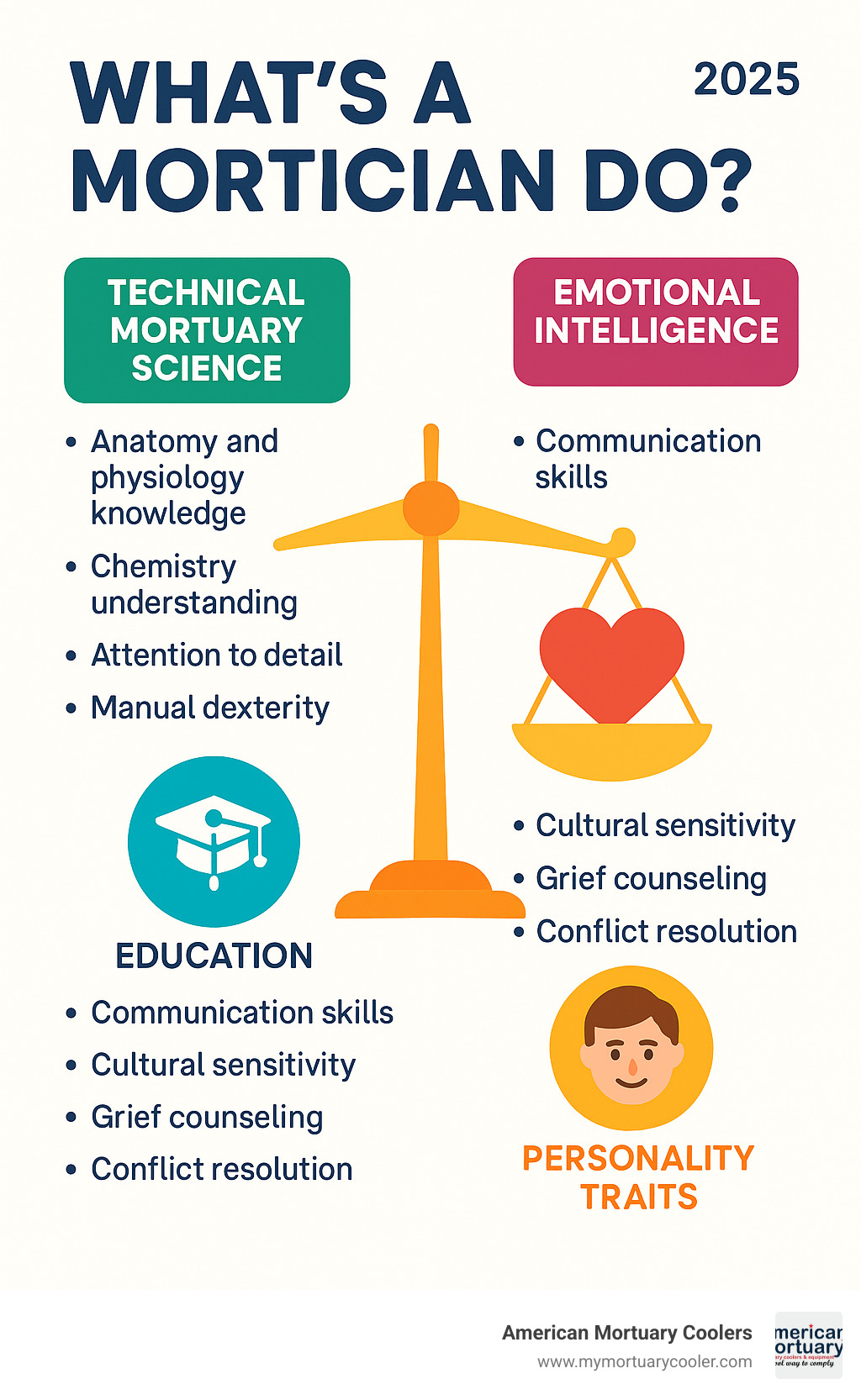
The work environment presents unique challenges. Death doesn't follow business hours, so you'll need to be available 24/7 for removals and emergencies. Weekend and holiday work is common, and families typically expect services to be arranged within 24 to 72 hours of death.
Business acumen often surprises newcomers to the field. Modern morticians must understand inventory management, coordinate with multiple vendors, handle insurance claims, and often supervise staff.
Rewards & Challenges of the Profession
Despite the demanding nature of the work, most morticians find deep purpose and meaning in their careers. There's something profoundly satisfying about helping families honor their loved ones with dignity during life's most difficult transition.
The community impact cannot be overstated. Morticians often become trusted advisors who families turn to for guidance beyond just funeral arrangements.
However, the psychological toll is real and shouldn't be minimized. Constant exposure to grief and traumatic deaths can lead to emotional burnout if not properly managed. Many successful morticians develop strong coping strategies early in their careers, including regular debriefing with colleagues and professional support networks.
The irregular schedule can strain personal relationships, yet many morticians find ways to build fulfilling personal lives by being intentional about their time off. From a practical standpoint, the profession offers job security in an essential service industry, along with competitive compensation and the opportunity to make a real difference in people's lives.
Education, Licensing & Career Path
So you're wondering what's a mortician do to prepare for this meaningful career? Most morticians start with an associate degree in mortuary science from programs accredited by the American Board of Funeral Service Education (ABFSE).
You'll study anatomy and physiology, chemistry and toxicology for embalming solutions, pathology and microbiology, plus grief counseling and psychology. You'll also learn funeral service law and ethics, restorative arts and cosmetology, and business management.
Getting Licensed: The Real-World Training
After graduation, you'll take the National Board Examination administered by the ABFSE. Once you pass, you'll begin a supervised apprenticeship that typically lasts one to three years, depending on your state's requirements.
During this apprenticeship, you'll work alongside experienced morticians who'll teach you what's a mortician do in real-life situations. Finally, you'll take your state licensing examinations and complete continuing education credits regularly to maintain your credentials.
The financial investment pays off well. The median annual wage for morticians was $49,800 in May 2024, while funeral home managers earned $76,830. Employment is projected to grow 4% from 2023 to 2033, with about 5,800 annual openings expected. More info about Mortuary programs and average salary data
Step-by-Step Roadmap to Becoming a Mortician
Starting in High School
Focus on science courses, especially biology and chemistry. Consider volunteer work with hospice organizations to understand whether you're comfortable around death and grief.
The College Years
Choose an ABFSE-accredited mortuary science program. These programs typically take two to four years and include extensive hands-on laboratory work.
Licensing and Apprenticeship Phase
After passing the National Board Examination, secure an apprenticeship position with a licensed funeral director. This is where you truly learn what's a mortician do on a daily basis.
Starting Your Professional Practice
Once you pass your state board examinations and obtain your licenses, you can begin independent practice. The learning never stops, though - continuing education requirements keep you updated on new techniques and regulations.
Global & State Variations in the Role
What's a mortician do can vary quite a bit depending on where you practice. Texas, for example, requires specialized coursework at state-approved schools, followed by a one-year apprenticeship. International differences are even more dramatic - in the United Kingdom, embalming training is optional rather than required.
Cultural considerations significantly impact what's a mortician do in different communities. Working in diverse areas means understanding various funeral customs, religious requirements, and family traditions.
Job Outlook, Salary & Industry Trends

If you're wondering whether becoming a mortician offers good career prospects, the answer is encouraging. The funeral service industry provides stable employment with steady growth, driven by the simple reality that death care services will always be needed.
Understanding what's a mortician do from a career perspective reveals a profession with solid financial prospects and job security. The U.S. Bureau of Labor Statistics projects 4% employment growth from 2023 to 2033, translating to about 5,800 annual job openings over the next decade.
Morticians earn a median annual wage of $49,800, while those who advance to funeral home management can expect $76,830 median annual wage. Location makes a significant difference - states like Connecticut offer average salaries of $73,740 annually for experienced professionals.
What's driving this steady demand? The aging baby boomer generation creates sustained need for funeral services. The rise in cremation rates hasn't hurt job prospects - families choosing cremation still need morticians for body preparation, viewing services, and memorial coordination.
Several exciting trends are reshaping what's a mortician do in modern practice. Eco-friendly and green burial services are growing rapidly, with families requesting natural burials without embalming and biodegradable caskets. Technology is also changing the industry - digital memorial services now include live-streaming funeral services and virtual reality memorial experiences.
Future-Proofing Your Career
Smart morticians are positioning themselves for long-term success by developing specialized skills. Niche service specializations like pet funeral services, military honor ceremonies, and cultural specialty services command premium pricing.
The business side of funeral service offers excellent advancement opportunities. Morticians who develop digital marketing skills and financial planning abilities often transition into management roles or start their own funeral homes.
Professional development through advanced certifications opens additional doors. Crematory operator certification, grief counseling credentials, and specialized business training all increase earning potential.
At American Mortuary Coolers, we've seen how successful funeral homes invest in quality equipment that supports both traditional services and emerging trends. Our custom mortuary coolers help morticians provide excellent service whether they're handling conventional preparation or adapting to green burial requests.
The funeral industry rewards those who approach it as both a calling and a business. With proper preparation and ongoing professional development, what's a mortician do can become a fulfilling and financially rewarding career.
Frequently Asked Questions About "What's a Mortician Do"
When people ask what's a mortician do, they often follow up with practical questions about the day-to-day realities of this unique profession. Let me address the most common concerns people have about entering this meaningful but demanding field.
What hours does a mortician typically work?
The schedule of a mortician is one of the most misunderstood aspects of the profession. Most morticians work full-time schedules that blend regular business hours with on-call availability. During typical daytime hours, they handle administrative tasks, meet with families, and perform body preparation work.
The 24/7 on-call nature of the work is unavoidable since death doesn't follow business hours. Morticians rotate emergency response duties among staff members, responding to calls from hospitals and residences within a few hours of notification.
Weekend and holiday work is common because these are often the only times when extended families can gather for services. The variable schedule can actually offer unexpected flexibility, with some morticians appreciating being able to handle personal appointments during weekday mornings.
Is mortuary work emotionally overwhelming?
This question touches on one of the biggest concerns people have about what's a mortician do emotionally. The work can be emotionally challenging, especially during your first year. You'll encounter families in their darkest moments and witness profound grief on a daily basis.
However, most morticians develop strong coping mechanisms that allow them to provide compassionate care without becoming overwhelmed. Professional counseling resources, peer support groups, and mentorship programs help new morticians learn healthy boundary-setting techniques.
Many morticians report that the work provides deep meaning and purpose rather than emotional drain. Being able to restore dignity to the deceased and provide comfort to grieving families creates a sense of service that sustains professionals through difficult days.
How long does it take to become licensed?
The path to becoming a fully licensed mortician requires patience and dedication. Most people complete the process in 3 to 7 years, depending on their educational choices and state requirements.
The typical educational path starts with a 2-year associate degree in mortuary science from an ABFSE-accredited program. After graduation, you'll need to complete an apprenticeship under a licensed funeral director, typically lasting 1 to 3 years.
The final step involves passing both national and state licensing examinations. Most students spend 3 to 6 months preparing for these comprehensive tests. The investment in time and education is significant, but the funeral service industry offers stable employment with opportunities for advancement.
Conclusion
Understanding what's a mortician do reveals a profession that's far more complex and meaningful than most people realize. These dedicated professionals blend scientific knowledge with genuine compassion, serving families during their most vulnerable moments while maintaining the dignity we all deserve in death.
From ancient Egyptian embalmers to today's licensed funeral directors managing digital memorial services, this essential profession has continuously evolved. Yet the core mission remains unchanged: providing respectful care for the deceased while supporting the living through their grief.
Modern morticians wear many hats throughout their day - preparing bodies with precise embalming techniques, comforting grieving families, coordinating services, and responding to emergency calls. This unique combination of technical expertise, emotional intelligence, and business acumen makes mortuary work both challenging and deeply rewarding.
The career path requires 3-7 years of specialized education, hands-on apprenticeship, and rigorous licensing exams. But for those called to this work, it offers genuine job security in meaningful service. With 4% projected growth and nearly 6,000 annual openings nationwide, opportunities exist for compassionate individuals ready to make a real difference.
The financial rewards match the professional demands, with morticians earning a median of $49,800 annually and funeral home managers reaching $76,830. More importantly, this profession offers the satisfaction of knowing your work matters during life's most significant moments.
At American Mortuary Coolers, we've had the privilege of working alongside funeral professionals across all 48 contiguous states for years. From our strategic locations in Tennessee, Atlanta, Chicago, Columbia, Dallas, Los Angeles, New York, and Pittsburgh, we've seen how dedicated morticians serve their communities with skill and heart.
We understand that quality equipment isn't just about functionality - it's about supporting the sacred work you do. Our custom mortuary coolers maintain the precise temperature control and reliability that funeral homes need to serve families with excellence.
Whether you're a student considering mortuary science or a funeral professional looking to better serve your community, what's a mortician do extends far beyond technical procedures. You're guardians of dignity, providers of comfort, and bridges between life and death that help families find peace during their darkest hours.
For funeral professionals ready to invest in equipment that matches their commitment to excellence, More info about custom mortuary coolers and find how our custom solutions can support your vital work in death care services.

















